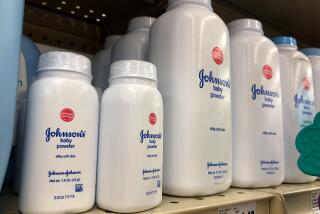Johnson & Johnson ordered to pay in suit over artificial hip
- Share via
A Los Angeles jury said healthcare giant Johnson & Johnson was negligent by selling a defective artificial hip and ordered the company to pay a retired prison guard $8.3 million in damages for his injuries.
But in a victory for the company, the 12-member jury declined to award any punitive damages even though the patient’s lawyer told jurors J&J;’s actions warranted up to $179 million in damages.
Friday’s verdict marks the first in more than 10,000 similar suits filed against the world’s biggest medical-products maker over this all-metal hip introduced in 2005 by DePuy, the orthopedic division of J&J.;
At the five-week trial, Loren Kransky, a 65-year-old former prison guard in Montana, testified that he suffered metal poisoning and other health problems from the company’s ASR XL hip implant he received in 2007.
After six days of deliberations in this closely watched case, jurors said the hip implant’s design was defective and the company was negligent. However, the jury rejected Kransky’s claim that J&J; failed to warn doctors about the product’s risks. The jury told J&J; to pay $338,136 for Kransky’s medical expenses and $8 million for his pain and suffering.
This ASR hip implant and other all-metal designs were once highly popular and accounted for an estimated 40% of all U.S. hip replacements in 2008. But since then, they have fallen out of favor as concerns grew about their effectiveness and safety. The company recalled about 93,000 ASR hips in 2010 after they were tied to higher-than-expected failure rates.
The company said it plans to appeal the jury’s decision that its design was defective. Last year, the New Brunswick, N.J., company took a $3-billion charge to cover costs related to the ASR hip recall, legal expenses and other related items.
“We believe the ASR XL was properly designed, and that DePuy’s actions concerning the product were appropriate and responsible,” said DePuy spokeswoman Lorie Gawreluk. “The company regrets that the ASR hip system did not perform as expected for some patients.”
Shares of J&J; rose 44 cents Friday to $78.19, a 52-week high.
Jury foreman Chris Alvarez, a UPS delivery driver, said he and another juror were the only ones in favor of levying punitive damages. He said he felt they were warranted because the company knew about high failure rates with the hip implant and it should have recalled the product before 2010.
Kransky’s attorneys presented evidence about a 44% ASR hip failure rate among Australian patients who had the implant seven years and also cited numerous complaints to the company from surgeons.
“I felt DePuy did too little, too late,” Alvarez said in an interview outside the courtroom. “They could have withdrawn it earlier.”
One of the company’s central arguments at trial was that Kransky’s injuries were caused by an unrelated infection in his hip, and that defense appeared to resonate with much of the jury, two jurors said. The company’s attorneys also focused on Kransky’s kidney cancer, diabetes and other long-standing medical problems.
David Vega, a juror and an engineer from Pico Rivera, said he felt Kransky’s hip implant was to blame for his injuries and he supported punitive damages. But he said other jurors thought the testimony about an infection was compelling.
“The company was not forthcoming about problems with the ASR hip and they dragged their feet,” Vega said. “I wanted punitive damages.”
Brian Panish, one of Kransky’s attorneys, said the company was apparently successful in attacking Kransky’s case by focusing on his other medical conditions. He said upcoming cases over this artificial hip probably would involve younger and healthier patients who later suffered crippling injuries from their implants.
“We will continue to try these cases to hold DePuy and Johnson & Johnson accountable for the harm they have caused thousands of patients,” Panish said. “This is the beginning of a long road until the company admits responsibility. We will get punitive damages next time.”
The next trial over this ASR hip is set to begin next week in Chicago, Panish said, and another trial is scheduled for this fall in Los Angeles.
At closing arguments, Panish had suggested that jurors award Kransky $5 million for his pain and suffering and up to $179 million in punitive damages.
In addition to this litigation, J&J; disclosed last month that federal officials are investigating the marketing of these hip replacements, a booming business as aging patients try to remain active. The company said it is cooperating fully with the government inquiry.
Overall, product safety issues have become a major headache in recent years for J&J;, long admired by consumers as a trusted medical name. The company has issued more than 30 product recalls since 2009.
More to Read
Inside the business of entertainment
The Wide Shot brings you news, analysis and insights on everything from streaming wars to production — and what it all means for the future.
You may occasionally receive promotional content from the Los Angeles Times.











